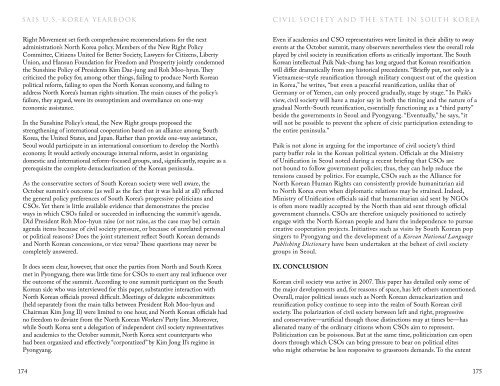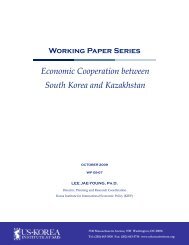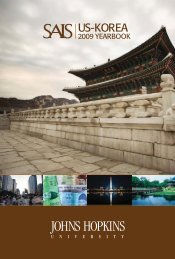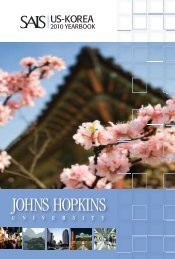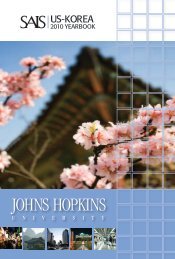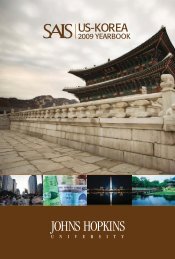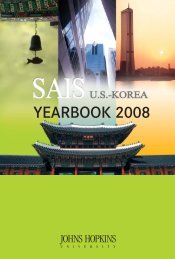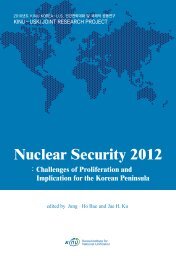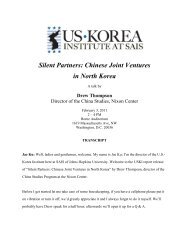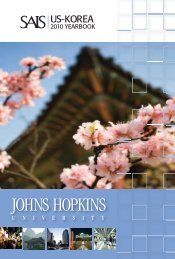Civil Society and the State in South Korea, by Michael Richardson
Civil Society and the State in South Korea, by Michael Richardson
Civil Society and the State in South Korea, by Michael Richardson
Create successful ePaper yourself
Turn your PDF publications into a flip-book with our unique Google optimized e-Paper software.
SAIS U.S.-KOREA YEARBOOK<br />
CIVIL SOCIETY AND THE STATE IN SOUTH KOREA<br />
Right Movement set forth comprehensive recommendations for <strong>the</strong> next<br />
adm<strong>in</strong>istration’s North <strong>Korea</strong> policy. Members of <strong>the</strong> New Right Policy<br />
Committee, Citizens United for Better <strong>Society</strong>, Lawyers for Citizens, Liberty<br />
Union, <strong>and</strong> Hansun Foundation for Freedom <strong>and</strong> Prosperity jo<strong>in</strong>tly condemned<br />
<strong>the</strong> Sunsh<strong>in</strong>e Policy of Presidents Kim Dae-jung <strong>and</strong> Roh Moo-hyun. They<br />
criticized <strong>the</strong> policy for, among o<strong>the</strong>r th<strong>in</strong>gs, fail<strong>in</strong>g to produce North <strong>Korea</strong>n<br />
political reform, fail<strong>in</strong>g to open <strong>the</strong> North <strong>Korea</strong>n economy, <strong>and</strong> fail<strong>in</strong>g to<br />
address North <strong>Korea</strong>’s human rights situation. The ma<strong>in</strong> causes of <strong>the</strong> policy’s<br />
failure, <strong>the</strong>y argued, were its overoptimism <strong>and</strong> overreliance on one-way<br />
economic assistance.<br />
In <strong>the</strong> Sunsh<strong>in</strong>e Policy’s stead, <strong>the</strong> New Right groups proposed <strong>the</strong><br />
streng<strong>the</strong>n<strong>in</strong>g of <strong>in</strong>ternational cooperation based on an alliance among <strong>South</strong><br />
<strong>Korea</strong>, <strong>the</strong> United <strong>State</strong>s, <strong>and</strong> Japan. Ra<strong>the</strong>r than provide one-way assistance,<br />
Seoul would participate <strong>in</strong> an <strong>in</strong>ternational consortium to develop <strong>the</strong> North’s<br />
economy. It would actively encourage <strong>in</strong>ternal reform, assist <strong>in</strong> organiz<strong>in</strong>g<br />
domestic <strong>and</strong> <strong>in</strong>ternational reform-focused groups, <strong>and</strong>, significantly, require as a<br />
prerequisite <strong>the</strong> complete denuclearization of <strong>the</strong> <strong>Korea</strong>n pen<strong>in</strong>sula.<br />
As <strong>the</strong> conservative sectors of <strong>South</strong> <strong>Korea</strong>n society were well aware, <strong>the</strong><br />
October summit’s outcome (as well as <strong>the</strong> fact that it was held at all) reflected<br />
<strong>the</strong> general policy preferences of <strong>South</strong> <strong>Korea</strong>’s progressive politicians <strong>and</strong><br />
CSOs. Yet <strong>the</strong>re is little available evidence that demonstrates <strong>the</strong> precise<br />
ways <strong>in</strong> which CSOs failed or succeeded <strong>in</strong> <strong>in</strong>fluenc<strong>in</strong>g <strong>the</strong> summit’s agenda.<br />
Did President Roh Moo-hyun raise (or not raise, as <strong>the</strong> case may be) certa<strong>in</strong><br />
agenda items because of civil society pressure, or because of unrelated personal<br />
or political reasons Does <strong>the</strong> jo<strong>in</strong>t statement reflect <strong>South</strong> <strong>Korea</strong>n dem<strong>and</strong>s<br />
<strong>and</strong> North <strong>Korea</strong>n concessions, or vice versa These questions may never be<br />
completely answered.<br />
It does seem clear, however, that once <strong>the</strong> parties from North <strong>and</strong> <strong>South</strong> <strong>Korea</strong><br />
met <strong>in</strong> Pyongyang, <strong>the</strong>re was little time for CSOs to exert any real <strong>in</strong>fluence over<br />
<strong>the</strong> outcome of <strong>the</strong> summit. Accord<strong>in</strong>g to one summit participant on <strong>the</strong> <strong>South</strong><br />
<strong>Korea</strong>n side who was <strong>in</strong>terviewed for this paper, substantive <strong>in</strong>teraction with<br />
North <strong>Korea</strong>n officials proved difficult. Meet<strong>in</strong>gs of delegate subcommittees<br />
(held separately from <strong>the</strong> ma<strong>in</strong> talks between President Roh Moo-hyun <strong>and</strong><br />
Chairman Kim Jong Il) were limited to one hour, <strong>and</strong> North <strong>Korea</strong>n officials had<br />
no freedom to deviate from <strong>the</strong> North <strong>Korea</strong>n Workers’ Party l<strong>in</strong>e. Moreover,<br />
while <strong>South</strong> <strong>Korea</strong> sent a delegation of <strong>in</strong>dependent civil society representatives<br />
<strong>and</strong> academics to <strong>the</strong> October summit, North <strong>Korea</strong> sent counterparts who<br />
had been organized <strong>and</strong> effectively “corporatized” <strong>by</strong> Kim Jong Il’s regime <strong>in</strong><br />
Pyongyang.<br />
Even if academics <strong>and</strong> CSO representatives were limited <strong>in</strong> <strong>the</strong>ir ability to sway<br />
events at <strong>the</strong> October summit, many observers never<strong>the</strong>less view <strong>the</strong> overall role<br />
played <strong>by</strong> civil society <strong>in</strong> reunification efforts as critically important. The <strong>South</strong><br />
<strong>Korea</strong>n <strong>in</strong>tellectual Paik Nak-chung has long argued that <strong>Korea</strong>n reunification<br />
will differ dramatically from any historical precedents. “Briefly put, not only is a<br />
Vietnamese-style reunification through military conquest out of <strong>the</strong> question<br />
<strong>in</strong> <strong>Korea</strong>,” he writes, “but even a peaceful reunification, unlike that of<br />
Germany or of Yemen, can only proceed gradually, stage <strong>by</strong> stage.” In Paik’s<br />
view, civil society will have a major say <strong>in</strong> both <strong>the</strong> tim<strong>in</strong>g <strong>and</strong> <strong>the</strong> nature of a<br />
gradual North-<strong>South</strong> reunification, essentially function<strong>in</strong>g as a “third party”<br />
beside <strong>the</strong> governments <strong>in</strong> Seoul <strong>and</strong> Pyongyang. “Eventually,” he says, “it<br />
will not be possible to prevent <strong>the</strong> sphere of civic participation extend<strong>in</strong>g to<br />
<strong>the</strong> entire pen<strong>in</strong>sula.”<br />
Paik is not alone <strong>in</strong> argu<strong>in</strong>g for <strong>the</strong> importance of civil society’s third<br />
party buffer role <strong>in</strong> <strong>the</strong> <strong>Korea</strong>n political system. Officials at <strong>the</strong> M<strong>in</strong>istry<br />
of Unification <strong>in</strong> Seoul noted dur<strong>in</strong>g a recent brief<strong>in</strong>g that CSOs are<br />
not bound to follow government policies; thus, <strong>the</strong>y can help reduce <strong>the</strong><br />
tensions caused <strong>by</strong> politics. For example, CSOs such as <strong>the</strong> Alliance for<br />
North <strong>Korea</strong>n Human Rights can consistently provide humanitarian aid<br />
to North <strong>Korea</strong> even when diplomatic relations may be stra<strong>in</strong>ed. Indeed,<br />
M<strong>in</strong>istry of Unification officials said that humanitarian aid sent <strong>by</strong> NGOs<br />
is often more readily accepted <strong>by</strong> <strong>the</strong> North than aid sent through official<br />
government channels. CSOs are <strong>the</strong>refore uniquely positioned to actively<br />
engage with <strong>the</strong> North <strong>Korea</strong>n people <strong>and</strong> have <strong>the</strong> <strong>in</strong>dependence to pursue<br />
creative cooperation projects. Initiatives such as visits <strong>by</strong> <strong>South</strong> <strong>Korea</strong>n pop<br />
s<strong>in</strong>gers to Pyongyang <strong>and</strong> <strong>the</strong> development of a <strong>Korea</strong>n National Language<br />
Publish<strong>in</strong>g Dictionary have been undertaken at <strong>the</strong> behest of civil society<br />
groups <strong>in</strong> Seoul.<br />
IX. CONCLUSION<br />
<strong>Korea</strong>n civil society was active <strong>in</strong> 2007. This paper has detailed only some of<br />
<strong>the</strong> major developments <strong>and</strong>, for reasons of space, has left o<strong>the</strong>rs unmentioned.<br />
Overall, major political issues such as North <strong>Korea</strong>n denuclearization <strong>and</strong><br />
reunification policy cont<strong>in</strong>ue to seep <strong>in</strong>to <strong>the</strong> realm of <strong>South</strong> <strong>Korea</strong>n civil<br />
society. The polarization of civil society between left <strong>and</strong> right, progressive<br />
<strong>and</strong> conservative—artificial though those dist<strong>in</strong>ctions may at times be—has<br />
alienated many of <strong>the</strong> ord<strong>in</strong>ary citizens whom CSOs aim to represent.<br />
Politicization can be poisonous. But at <strong>the</strong> same time, politicization can open<br />
doors through which CSOs can br<strong>in</strong>g pressure to bear on political elites<br />
who might o<strong>the</strong>rwise be less responsive to grassroots dem<strong>and</strong>s. To <strong>the</strong> extent<br />
174 175


